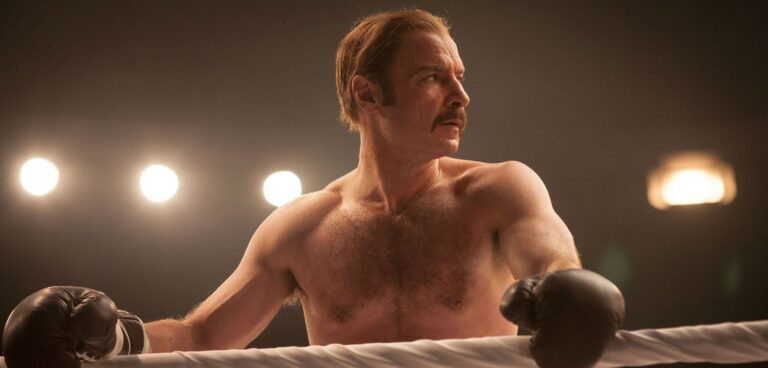Sylvester Stallone electrified moviegoers with the 1976 classic Rocky, but few people realize the tale of an ordinary guy stepping into the ring with the heavyweight champion was inspired by real-life events, when a New Jersey prizefighter named Chuck Wepner shocked the world by going toe-to-toe with Muhammad Ali for fifteen grueling rounds. And although Wepner didn’t quite “go the distance” like his big screen avatar – he lost the bout via TKO with mere seconds left in the final round – his underdog story turned him into a hometown hero.
In Chuck, Liev Schreiber portrays the titular pugilist, a liquor salesman from a working-class neighborhood who rises through the boxing ranks with the help of his crafty, grizzled cornerman (Ron Perlman). Chuck is the kind of affable schlub that everyone likes, and he becomes a sensation after a high profile bout against Muhammad Ali (Pooch Hall), where he becomes the third person in history to take the champ off his feet – sure, he might have stepped on Ali’s foot while landing the decisive blow, but who cares? He’s a bona fide star now, but the trappings of being a local celebrity – staying out all night, drinking excessively and flirting with every good-looking woman he meets – threaten to derail his marriage to Phyllis (Elizabeth Moss).
Chuck’s dogged determination to take everything Ali threw at him becomes the inspiration for the protagonist’s journey in Stallone’s classic boxing saga, and before long Chuck is bragging to everyone who will listen that he’s “the real Rocky.” He even manages to smooth-talk his way into a meeting with Sly himself (Morgan Spector), who seems genuinely honored to make his acquaintance and offers him a small role in the sequel. But sudden fame can have some ugly side effects, and Chuck’s obsession with being the talk of the town leads to a drug-fueled downward spiral that seems destined to tarnish his legacy forever.

Directed by Philippe Falardeau, Chuck is something of an atypical boxing film in that it spends very little time in the ring, focusing more on the myriad ways in which the sport impacts Chuck’s life and his relationships. Schreiber manages to keep the character empathetic despite a seemingly never-ending series of poor decisions and even worse behavior. Surprisingly for a film of this ilk, the primary female characters are fully developed instead of merely serving as plot devices: Moss is tremendous as Chuck’s fiery, long-suffering wife, and Naomi Watts is equally solid as the bartender who sees right through Chuck’s act, yet can’t help but be a little smitten with the big lug.
Chuck isn’t likely to find itself counted among the great sports movies of all time – it’s Schreiber’s charisma that will keep audiences engrossed, and not the familiar, paint-by-numbers screenplay – but it’s a perfectly enjoyable yarn about the little-known facts behind one of cinema’s most celebrated stories, and a nice bit of counter-programming against the coming onslaught of summer studio tentpoles.
The story of the real-life fighter who influenced one of the most celebrated cinematic heroes of all time is anchored by Schreiber's charismatic performance, which offsets the screenplay's shortcomings.
-
Score7

